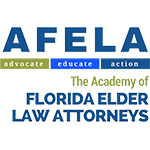Formal Administration
When a loved one passes away, his or her estate often goes through a court-managed process called probate or estate administration where the assets of the deceased are managed and distributed. If your loved-one owned his or her assets through a well drafted and properly funded living trust, it is likely that no court-managed administration is necessary, though the successor trustee needs to administer the distribution of the deceased's assets. The length of time needed to complete the probate of an estate depends on the size and complexity of the estate and the local rules and schedule of the probate court. Every probate estate is unique, but most involve the following steps:
- Filing of a petition with the proper probate court.
- Notice to heirs under the Will or to statutory heirs (if no Will exists).
- Petition to appoint personal representative (in the case of a Will) or Administrator for the estate.
- Inventory and appraisal of estate assets by personal representative/Administrator.
- Payment of estate debt to rightful creditors.
- Sale of estate assets.
- Payment of estate taxes, if applicable.
- Final distribution of assets to heirs.
What happens if someone objects to the Will?
An objection to a Will, also known as a “Will contest” is a fairly common occurrence during the probate proceedings and can be incredibly costly to litigate. In order to contest a Will, one has to have legal “standing” to raise objections. This usually occurs when, for example children are to receive disproportionate shares under the Will, or when distribution schemes change from a prior Will to a later Will. In addition to disputes over the tangible distributions, Will contests can be a quarrel over the person designated to serve as personal representative. Does probate administer all property of the deceased? Probate is primarily a process through which title is transferred from the name of the deceased to the names of the beneficiaries.
Certain types of assets are what is called “non-probate assets” do not go through probate. These include:
- Property in which you own title as “joint tenants with right of survivorship”. Such property passes to the co-owners by operation of law and do not go through probate.
- Retirement accounts such as IRA and 401(k) accounts where there are designated beneficiaries.
- Life insurance policies where there are designated beneficiaries.
- Bank accounts with “pay on death” (POD) designations or “in trust for” designations.
- Property owned by a living trust. Legal title to such property passes to successor trustees without having to go through probate.
Do I get paid for serving as an personal representative?
Personal representatives are reimbursed for all legitimate out-of-pocket expenses incurred in the process of management and distribution of the deceased estate. In addition, you may be entitled to statutory fees, which vary from location to location and on the size of the probate estate. The personal representative has to fulfill his or her fiduciary duties on behalf of the estate with the highest degree of integrity and can be held liable for mismanagement of estate assets in his or her care. It is advised that the personal representative retain an attorney and an accountant to advise and assist him with his or her duties. How much does probate cost? How long does it take? The cost and duration of probate can vary substantially depending on a number of factors such as the value and complexity of the estate, the existence of a Will and the location of real property owned by the estate. Will contests or disputes with alleged creditors over the debts of the estate can also add significant cost and delay. Common expenses of an estate include personal representatives fees, attorneys fees, accounting fees, court fees, appraisal costs, and surety bonds. These typically add up to 2% to 7% of the total estate value. Most estates are settled though probate in about 9 to 18 months, assuming there is no litigation involved.
Summary Administration
In Florida, summary administration is a probate procedure available for the administration of estates that meet either of the following requirements:
• Probate assets under $75,000, or
• The decedent has been dead for over two years
For example, if your loved one passed away with $25,000 in assets subject to probate, summary administration can be used because the size of the estate is small. If one of your family members died with $300,000 in assets more than three years ago, the estate qualifies for summary administration. Our lawyers are highly aware of the summary administration requirements. We can help you understand if the estate qualifies for summary administration or if the formal probate process must be followed.
Summary Administration is a Streamlined Probate Process
If the estate qualifies for summary administration, the simplified process can be completed in a matter of days. This can be accomplished by petitioning the probate court to order the distribution of the decedent's assets to his or her heirs. If the probate court deems the petition to be proper, it will issue an order of summary administration, which authorizes the estate assets to be distributed to the proper beneficiaries or heirs at law.
How Are Debts Handled Through Summary Administration?
If the estate qualifies for summary administration solely because its value is less than $75,000, then all estate debts must have been paid or arrangement for payment must have been made. Therefore, in the petition for summary administration, you will be asked to confirm that you know of no debts owed by the decedent that have not already been paid or provisions for payment have been made.
This is important because when an order of summary administration is issued, the petitioner becomes personally liable for all lawful claims and demands against the estate of the decedent. However, this liability cannot exceed the gross value of the estate property actually received by the petitioner.
Larger estates can qualify for summary administration if the decedent has been dead for at least two years. Since the statute of limitations for creditors to file a claim against a decedent's estate is two years, there is no need for the claims procedure of formal administration.
Ancillary Administration
There are many people who own property in the state of Florida but do not reside in Florida. If someone passes away (the decedent) who resides in another state, but owns property in Florida, the Florida property needs to be distributed according to the decedent’s wishes. However, the main probate case will likely need to be opened in the state where the decedent resided at the time of his or her death. So how does the decedent’s property in Florida get transferred to his or her loved ones? The answer is ancillary probate administration.
In Florida, ancillary probate administration is defined under Chapter 734, Florida Statutes. Under section 734.102(1), Florida Statutes, “If a nonresident of this state dies leaving assets in this state, credits due from residents in this state, or liens on property in this state, a personal representative specifically designated in the decedent’s will to administer the Florida property shall be entitled to have ancillary letters issued, if qualified to act in Florida.” Furthermore, section 734.102(1), Florida Statute goes on to state that if there is no special personal representative named in the decedent’s will for Florida property, the foreign personal representative can act for the ancillary administration, if the foreign personal representative is qualified to act under Florida law. If the decedent passes away without a valid will, then the personal representative for the Florida ancillary probate administration will be named according the order of preference set out in Chapter 733, Florida Statutes.
It is important to remember that ancillary administration applies only to assets of a decedent’s probate estate, not to creditors. Thus, if a decedent owes money to a creditor in Florida or another state, that creditor can still file claims in both the main probate case according to the particular state’s law, or in the ancillary administration. However, if a decedent does not own property in Florida, but owes money to creditors in Florida, there is no need for an ancillary administration in Florida.
Additionally, it is good to remember what types of assets can qualify for ancillary administration. Section 734.102, Florida Statutes sets out several different types of assets that will require ancillary administration. First, there are the common types of assets such as a house, condo, other real property, or a car. Then there are the other, less common, types of assets that may require ancillary administration. Some examples of these assets include:
• The decedent loaned money to someone in Florida and that person is making payments on the loan the decedent at the time of his death. The loan itself is an asset of the probate estate and ancillary administration may be required to transfer the loan according to the decedent’s will or the intestacy statutes in the state of residency.
• The decedent provided a person with a loan secured by a mortgage in Florida. See the loan example above.
• The decedent owns a boat or a mobile home that is titled by the state of Florida.
Ancillary administration works similarly to a regular Florida probate administration. The procedure, and it similarities to a regular Florida probate administration are also set out in section 734.102, Florida Statutes. The personal representative may be required to give bond, under the requirements of the Florida Probate Code. The Florida Probate Rules apply in ancillary probate administrations. The personal representative for an ancillary administration is required to provide notice to creditors of the decedent, just as in a regular Florida probate proceeding. At the conclusion of the ancillary administration, the remaining assets are transferred to the personal representative in the main probate administration to be distributed according to the will or the intestacy laws of the state.
If the property owned by the decedent in Florida is valued at less than $50,000 and the decedent died with a will, the personal representative in the foreign probate administration may be able to conduct a “summary” ancillary administration as set out in section 734.1025, Florida Statutes. In order to conduct the “summary” ancillary administration, the foreign personal representative needs to file an authenticated or exemplified copy of the foreign probate administration showing the will and beneficiaries with the clerk of court where the Florida property is located. The foreign personal representative will then need to notice the creditors of the decedent in accordance with the Florida Probate Rules. If any creditors file a statement of claim in the case, the case must carry on as a traditional ancillary administration with a personal representative appointed. If no statements of claim are filed within the appropriate time period, the assets can be distributed to the foreign probate administration to be distributed.
If you have a loved one who had passed away in another state, but has assets located in Florida, you should talk to your probate attorney about hiring a Florida probate attorney. It is important to do ancillary probate at the time of the main probate administration, because if the property in Florida was not probated at the same time, the original probate may need to be reopened in order to transfer the Florida property. If your loved one owned property in Florida, but resided in another state, contact our firm today to schedule a free consultation. Our attorneys will work with the out of state probate attorneys to make sure the ancillary administration is completed efficiently, so that the property can be transferred according to your loved one’s wishes.
Florida Trust Administration
The average person has had little experience dealing with trusts and often has many questions upon becoming a trustee for the first time. Through our experience in helping people administer trusts, we have found that many individuals have unreasonable expectations concerning the way living trusts operate following a death. It is true that a living trust in many cases drastically reduces the costs and delays involved in passing on assets at death. A living trust accomplishes this feat by avoiding probate. However, even without a probate, many administrative chores have to be completed, legal documents prepared, taxes returns filed, and other matters that take time and cost money.
Living Trusts and Probate Avoidance
Although living trusts have been around for centuries, only recently have they achieved a high degree of popularity among the general public. The reason for this surge in popularity is that living trusts help to avoid probate. You might be wondering, What is probate, and why is everyone trying so hard to avoid it? The short answer is that probate is a court-supervised procedure for collecting a deceased person's assets, paying debts and taxes, and distributing the property to the person's beneficiaries (either according to the instructions the person set forth in his or her will or as determined by state law if the person died without a will). The probate process usually takes 8 or more months to complete, although it may take longer in complicated cases.
Living trusts avoid probate with respect to those assets that are transferred into the living trust before death. In other words, living trusts avoid the court procedure otherwise required to transfer assets to a person's beneficiaries at death. However, even though no court procedure is involved, that does not mean there is nothing to do. The living trust makes administration easier, but it does not do away with administration altogether. For example, assets still have to be collected and managed pending distribution to the beneficiaries, appraisals of assets have to be made, debts and taxes have to be paid, tax returns may be required (living trusts do not avoid estate taxes, as some people have been led to believe), and legal documents must be prepared in connection with the distribution of the trust property to the beneficiaries. These activities are very similar to a probate. The major difference is that, with a living trust, everything is handled privately, without court supervision, which makes for (in most cases) a faster, less expensive administration process.
Thus, although it may come as a surprise to you, you should realize that post-death administration of a living trust will take time and cost money, such as legal fees, accounting fees, asset transfer fees, and your own Trustee fees if you decide to accept any. The other beneficiaries of the Trust, if any, will also need to understand that the process may take longer than they anticipated. However, in comparison to probate, these delays and costs are substantially reduced, often resulting in time savings of months and costs savings of 50 to 90 percent.
Court Involvement
There is also a popular misconception that the existence of a living trust avoids all possibility of court involvement. This is true (in part) only if all of the Settlor's assets were properly funded into the living trust.
Moreover, if at any time a beneficiary of the Trust believes that the Trustee has acted improperly or without regard for the beneficiary's interests, the beneficiary may file a petition with the court to force the Trustee to make a full report and accounting or to redress an alleged breach of trust, including removal of the Trustee or surcharge against the Trustee.
Finally, circumstances may arise in which there are questions about whether the Trustee should or should not take certain actions (e.g., selling a business interest or real property, commencing litigation). In such cases, it may be advisable for the Trustee to petition the court for instructions whether to proceed in a certain way. The beneficiaries will be given notice of the hearing and will be given a copy of the petition that describes the proposed action. The matter will then be addressed in open court, and the beneficiaries will have an opportunity to appear in court and be heard. By obtaining an order from the court in this manner, the Trustee may be able to cut off the beneficiary's right to complain about the particular action if he or she fails to appear in court. Such a petition protects the Trustee if there is a fear that the Trustee's decision will be second-guessed by a beneficiary. Also, if relations between the Trustee and the beneficiaries are hostile, it may be advisable for the Trustee to seek court approval of the Trustee's accountings to minimize potential arguments with the beneficiaries.
Administration of the Living Trust
After the Settlor's death, the Trust continues as a management and distribution vehicle that will exist only as long as is necessary to identify and collect trust assets, pay debts and taxes, and distribute the trust assets to the beneficiaries (or in further trust, depending on the terms of the Trust). You might visualize this trust as a funnel through which all of the trust assets will pass to the beneficiaries (with the exceptions of tangible personal property, life insurance proceeds, and other nontrust assets that may pass directly to the beneficiaries outside the Trust). It is the successor Trustee's job to collect and manage the trust's assets, appraise trust property, pay all taxes and expenses relating to the administration of the Trust, and distribute the trust property according to the Settlor's instructions.






